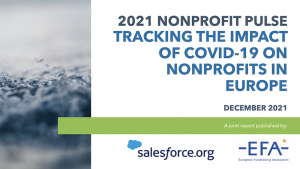
Fundraising Norway urges government to protect tax deductions for donors
December 8, 2021
European philanthropy bodies converge to form Philea
December 9, 2021Charitable income is on the rise as nonprofits continue to adapt and innovate to overcome the challenges of the global pandemic, according to a new report released today by the European Fundraising Association (EFA) and Salesforce.org.
 Based on a survey of 480 nonprofit representatives across Europe, the 2021 Nonprofit Pulse Report reveals that 2 in 3 respondents expect their total income in 2021 to exceed or match income from last year.
Based on a survey of 480 nonprofit representatives across Europe, the 2021 Nonprofit Pulse Report reveals that 2 in 3 respondents expect their total income in 2021 to exceed or match income from last year.
Although half of respondents had to cancel or postpone fundraising activities during the year, nonprofits innovated and diversified, ramping up their use of digital. More than 2 in 5 reported a rise in individual giving over the past year, with 1 in 4 saying donation levels were stable. As demand for services continues to rise and social distancing restricts face-to-face outreach, over half (55%) have developed new ways to deliver their mission and reach beneficiaries.
Concerns about increased workloads and pressure on staff
However, the report exposes concerns about rising workloads and increased pressure on nonprofit staff. A second year of lockdowns, remote working, cancelled fundraising events, barriers to service delivery and a general climate of uncertainty is taking its toll on the sector’s workforce.
When asked to identify the biggest challenges facing their nonprofit now, the ability to manage workload topped the list, cited by more than half of respondents (52%). 4 in 10 report that staff and volunteers are more stressed than they were pre-pandemic.
As nonprofits continue to adapt to new ways of working and often longer task lists, sector capacity is being stretched. 1 in 3 representatives report a drop in volunteers and 1 in 5 a reduction in staff.
Eduard Marček, former President of EFA and Head of the Slovak Fundraising Centre, says:

Eduard Marček, Slovak Fundraising Centre
“Nonprofits have proved themselves to be hugely resilient and agile, but this cannot come at the expense of the sector’s workforce; the people who work so hard to protect good causes and the most vulnerable communities around us.
“Remote working, reduced staff and volunteer capacity, restricted budgets and higher demand for services are all adding to the challenge of managing workload in an ever-changing environment.
“The biggest challenge ahead of us now surely is not only how to survive and thrive through the next phase of the pandemic, but how best to support and nurture our people and ease workloads. It’s no easy feat but protecting our people has never been more important.”
Developing stronger supporter relationships
Digital has become critical for fundraising and service delivery in a socially-distanced world, but the shift in channels comes alongside a renewed focus on relationship building and supporter care, which are taking a front seat in fundraising strategies. Half of respondents say they are increasing their focus on supporter retention, and 1 in 3 say that supporter relationships have strengthened during the pandemic.
Bijan Bedroud, Senior Vice President and General Manager International at Salesforce.org, adds:
“We know that supporters and volunteers are the lifeblood of the nonprofit community and it’s amazing to see how the shift to digital has enabled organisations to strengthen this bond. The sector has shown its commitment and endurance during the pandemic, and even if we all look forward to more in-person events, the nonprofit community continues to embrace new channels and the opportunities they bring.”
Reactions from the sector
Responding to the findings, Ceri Edwards, Director of People & Engagement at the Chartered Institute of Fundraising and Vice President of EFA, says:
“These findings are a fascinating snapshot of the impact on fundraising across Europe during 2021. It’s clear that the pandemic continues to place challenges on fundraisers all over the continent and is transforming fundraising strategies for the longer-term, especially with the increased focus on digital and opportunities of online events and new channels. While it is encouraging that income for charities is increasing and that fundraising is recovering compared to 2020, significant challenges remain.
“From the UK perspective, it’s concerning that respondents are most likely to say that they have bigger workloads and that staff are more stressed. We need a fundraising workforce that is energised and healthy to be able to raise the funds that our causes need, and the Chartered Institute of Fundraising will be working with its members to develop the right tools, support and training to achieve that.”
Martin Georgi, Chair of the German Fundraising Association (DFRV) highlights nonprofits’ resilience, saying:
“Organisations in Germany were remarkably resilient in the crisis and many even managed to increase their income significantly through active fundraising. Digital channels have become ever more important, but mail and telephone also worked well in the pandemic since donors could be more easily reached at home: the overall outlook for fundraising is optimistic.
“Challenges were faced by organisations that depend on income from live events and for all organisations providing services, not all of which could be easily transferred easily to digital formats. A particular note of concern for the coming months is the continuing high workload – after almost two years of extra efforts and reconciling sometimes conflicting private and professional pressures, and with the pandemic not yet over, many staff and volunteers are struggling or even suffering and need some relief.”
Commenting on the Irish market, Scott Kelley, Chief Operating Officer of Charities Institute Ireland, adds:
“The pandemic has caused a lot of change in our society and this survey demonstrates that the Irish public has responded to the pressures on charities. The lockdowns and the curtailment of our normal social lives have given donors a fresh perspective on charities and the work we do. Many charities have responded to a collapse in traditional fundraising (events, face-to-face) by seeking donations online through digital platforms. This is encouraging because it is impossible to envisage a future without a significant level of fundraising being carried out online or remotely.”
Main photo by Frauke Riether on Pixabay




